I get a lot of notifications on social media, but this one was different. A professor at Palm Beach Atlantic University (PBAU), Samuel Joeckel, had tagged me in an Instagram post about an incident with his administration after class one day. It became the latest salvo in an increasingly intense and high-stakes conflict over teaching about race in higher education.
PBAU brands itself as a conservative Christian college where “faith and freedom matter.” But in response to one parental complaint, this university is examining syllabi mid-semester for signs of racial “indoctrination.” Such actions are becoming more commonplace in educational settings.
The school is in Florida where Governor Ron DeSantis recently made national headlines for objecting to the proposed Advanced Placement African American Studies framework, which he said “lack(ed) educational value.”
The actions of university officials at PBAU also echo the stance of Grove City College, another conservative higher education institution in Western Pennsylvania. The board of trustees at Grove City officially adopted and approved a report that analyzed “mission drift” at the school for promoting what they labeled Critical Race Theory.
Below is an interview with Professor Joeckel on his experience of being scrutinized for teaching a unit on racial justice. It has been edited for length and clarity.
Your tax-deductible gift helps our journalists report the truth and hold Christian leaders and organizations accountable. Give a gift of $30 or more to The Roys Report this month, and you will receive a copy of “Hurt and Healed by the Church” by Ryan George. To donate, click here.
You recently posted on Instagram about an encounter with your administration about teaching racial justice. What happened after your class that day, and what was your immediate response?
On Feb. 15, I concluded a class and walked out of the classroom to find the provost, Chelly Templeton, and the dean of the School of Liberal Arts and Sciences, Robert Lloyd, waiting for me.
They asked to speak with me privately.
We stepped back into the classroom. The dean had an envelope in his hand and gave it to me. He said the letter inside was to notify me that my contract was being delayed, pending a review of the material I use in my racial justice unit.
I asked him what the concern was. He said the concern was that I was “indoctrinating students.”
Dean Lloyd said the president of the university, Debra Schwinn, received an angry phone call from a parent of a student. The parent insisted I was “indoctrinating” their child because of the content I had recently taught on racial justice.
In the 12 years I have been teaching a racial justice unit, no PBAU administrator had ever voiced any concern about my unit. This was the first time.
So, the first time was also the time when I was told my contract may not be renewed. I was told I would be notified on or before March 15 if the contract would be renewed.
All of this came out of nowhere. I had no idea this was coming. I felt completely disrespected.
Keep in mind I have taught at this university for over 20 years. The administration at the highest level showed absolutely no confidence in me. They seemed to value the complaint of one parent over the solid record of teaching I have accumulated over 20 years.
Why did you decide to go public with what happened to you?
One of the university’s core values is accountability. I went public with this because I felt it was time for the university itself to assume some accountability.
In response to my public post, a number of comments from PBAU people — current and former students, former faculty and staff — said in one variation or another, “Disappointing, but not surprised.”
It is time for PBAU to acknowledge that many people are not surprised and to ask, “Why are they not surprised?”
What are we doing wrong? I cannot and will not speak for people who, now and in the past, have experienced racial injustice at PBAU. I will only speak from my perspective.
A few years ago, it seemed like we were heading in the right direction when the relatively new president formed a committee on campus called The Council for Intercultural Relations. The president seemed to be concerned about racial injustice.
I was a member of this committee and was assigned to the curriculum sub-committee. During that following semester, the committee met only a few times. In the end, the curriculum committee did absolutely nothing. It was a complete waste of time.
So PBAU needs to be held accountable. Obviously, what they are doing hurts me, but even more destructively, what they are doing to me shows they are, at the very least, predisposed to turn a deaf ear to racial injustice.
They need to read and reflect on what MLK wrote, “Like a boil that can never be cured so long as it is covered up but must be opened with all its ugliness to the natural medicines of air and light, injustice must be exposed, with all the tension its exposure creates, to the light of human conscience and the air of national opinion before it can be cured.”
It won’t be pretty, it won’t be easy, but PBAU needs to expose its boil so injustice can be exposed. Only when that happens can the university heal.
What has been the public response?
The public response has been overwhelming. I am encouraged so much by all the current and former students who have told me they stand by me.
Former students throughout the country have not only given me moral support but have used their influence to arrange for interviews with local and national media to draw attention to this injustice.
A student has also started a petition to mobilize support for me and, more significantly, for educational integrity.
And just on a personal level, I have now reconnected with people I have not talked to in five, 10 and even 20 years.
What do you teach at PBAU, and how long have you been teaching there?
I have been teaching at PBAU for over 20 years and have taught 18 different courses: composition courses; upper-level English courses; a number of different honors courses; and humanities courses. I also led the university’s London Semester on two separate occasions and developed courses specifically that focused on London museums, literary sites and history.
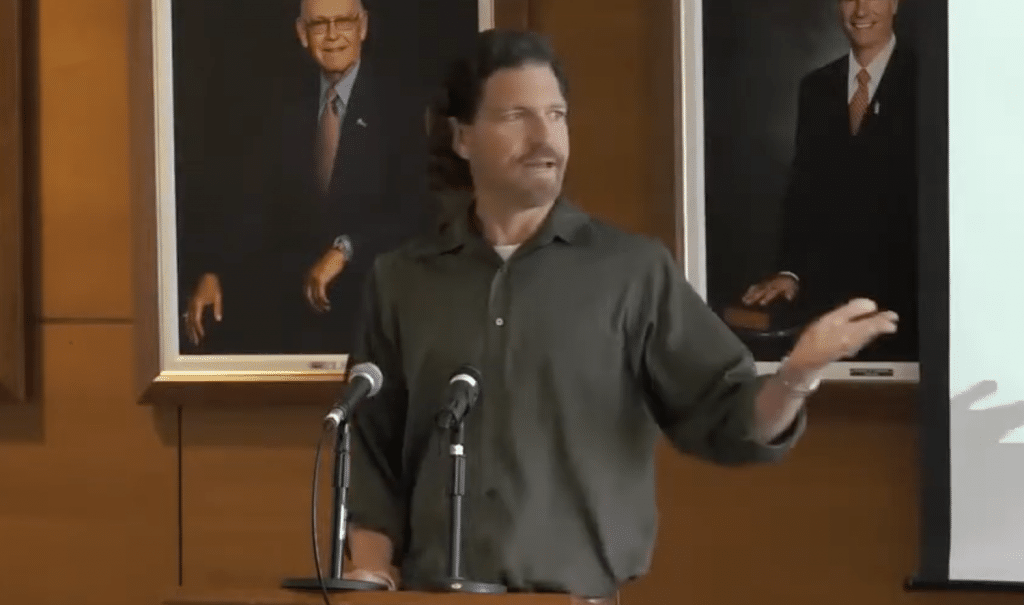
Do you mind sharing a little about the racial justice unit you taught?
The main purpose of my unit on racial justice is for students to critically reflect on moments in history, texts and data that have shaped and continue to shape discussions of race and racism in the United States. Students are not told what to think about these materials; they come to their own conclusions.
I taught about racial justice for three days as part of my composition class. I lectured for two days, including a discussion of the introduction from your book, “The Color of Compromise.” Then on the third day, I helped students as they began writing an essay in class about racial justice.
What does the administration hope to achieve with these kinds of reviews in your opinion?
While I cannot say for certain what the administration hopes to achieve, it seems they are conforming to a toxic political culture.
This culture believes talking about contemporary racism will always lead to indoctrination. This culture does not want to have those uncomfortable, yet necessary, conversations that have nothing to do with indoctrination.
Instead, these conversations have everything to do with facing reality, being compassionate, cultivating the moral imagination to see things from other perspectives and, if you are a Christian, living out the gospel.
Is your job at risk? Have you thought about what you’ll do if the administration pushes for your dismissal?
I think I may very well be fired. At PBAU, if the university does not renew your contract, they do so either because they are making budget cuts or they are firing you. If I am fired, I will continue to do what I can to make PBAU accountable. Of course, I also need to think about me and my family, so I plan to hire a lawyer.
What’s the best outcome of this situation from your perspective?
The best outcome for me personally would be for the university to renew my contract. But beyond me, the best outcome would be for the university to expose that metaphorical boil I mentioned earlier.
The university should confess, repent, assume accountability. Then reconciliation will occur.
The university also needs to honor academic freedom. Right now, I imagine every PBAU professor is wondering if they might get called out for something they teach. If it can happen to a professor who has been here for over 20 years, it can happen to anyone.
How can we support you at this time?
You can support me by getting the word out — to help me make PBAU accountable.
PBAU does not want to talk about race and racism unless they are framed a certain way: a certain comfortable, low-stakes way. Christian universities should not be afraid to have more substantive, even uncomfortable, conversations about racism.
But as hard as these conversations are, everyone involved should not be afraid to make mistakes. As a white man teaching racial justice, I admit I have made mistakes. But I never want my mistakes to end the conversation.
Inside and outside the university classroom, let’s learn from our mistakes, let’s talk with each other, let’s learn from each other.
This views expressed in this commentary, originally published by Religion News Service, do not necessarily reflect those of The Roys Report.
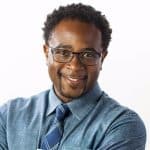 Jemar Tisby, PhD, a professor of history at Simmons College of Kentucky, wrote “The Color of Compromise” and “How to Fight Racism.” He frequently writes about race, religion and politics in his newsletter, “Footnotes.”
Jemar Tisby, PhD, a professor of history at Simmons College of Kentucky, wrote “The Color of Compromise” and “How to Fight Racism.” He frequently writes about race, religion and politics in his newsletter, “Footnotes.”




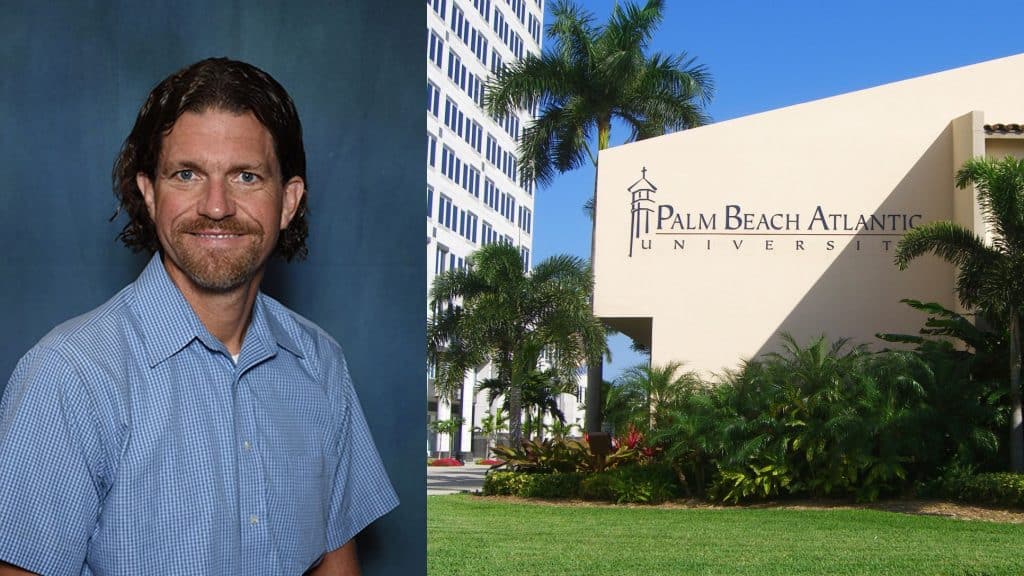
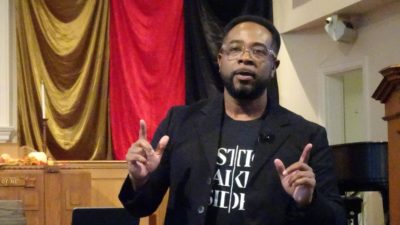

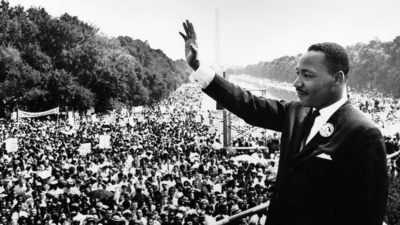

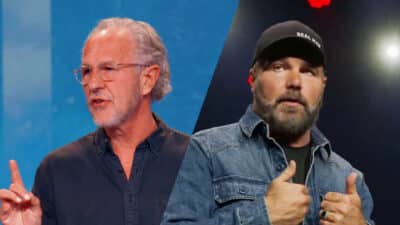
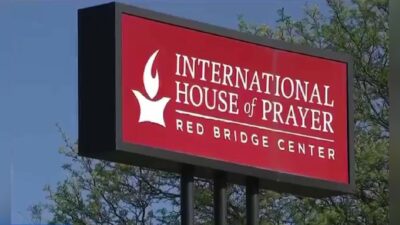
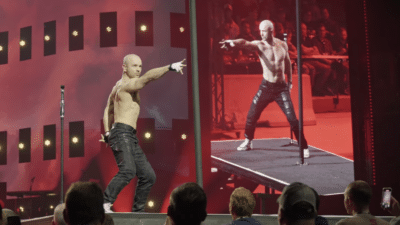

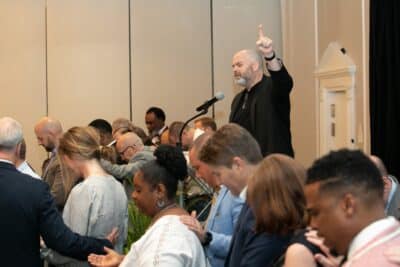






19 Responses
Author Tisby, Ph.D., and Julie Roys, this is a provocative, attention-getting headline. Would you please take the next step in telling this story, and publish Professor Samuel Joeckel’s course syllabus; his “Racial Justice” PowerPoint slides; and a synopsis of his comments pertaining to racial justice?
Yes, David Connon, we haven’t been given a 360 degree view of this issue. We don’t know what the professor’s course content is and until we do, this article by Tisby is one-sided. And if one goes to Tisby’s website, one finds out that he is woke and liberal. He laments that 80% of white evangelicals voted for Trump in 2016. Were we supposed to vote for Hillary? Did Tisby vote for Hillary? On race relations, I prefer conservative Christian pastor Voddie Baucham and his book Fault Lines. Also, I’m not sure why Tisby is writing for Julie Roys.
If they are concerned about “indoctrination’ I’m sure all their classes on Bible and theology will allow students to reach their own conclusions with no repercussions.
Dear Jemar Tisby, Julie Roys, and Samuel Joeckel, I have some questions.
1. Many universities have all-Black dormitories, and some have all-Black graduation ceremonies. Furthermore, here in Canada, the Toronto District School Board (public) has an all-Black africentric school. Do you support these developments?
2. The University of California has declared this statement racist: “There is only one race and that is the human race.” Do you support the statement or do you support the University of California?
3. Is the goal of being “colorblind” – doing one’s best to ignore a person’s skin color and concentrating only on the person’s character and personality- a noble goal or a racist one?
4. Do you believe that all White people are racist?
5. If your answer is “yes” would you tell Black people from Africa and the Caribbean who wish to immigrate to America, Canada, or the U.K. (my country of origin) that they would be making a poor decision? If not, why not?
6. Do you believe that it is possible for a Black person to be a racist?
I await your response.
Mark –
As a Black woman who attended a university with these “Black” dorms and ceremonies, please allow me to chime in.
1. These dorms are ethnically themed houses. They serve as “cultural centers” that host programming (e.g., Black History Month speaker series), with decor representative of the culture (e.g., Black artwork, shelves of books by prominent Black authors, quotes on walls from prominent Black leaders, etc). Students of other races are welcome to live there (at my university 50% of the slots were reserved for non-Black students) as the opportunity to immerse themselves in a non-dominant culture. Christian McCaffery (white football player) notably lived in Ujamaa house (the Black dorm at Stanford) and credits the experience with giving him a different persective and deeper relationships with Black students.
Likewise, the graduations are cultural celebrations that are smaller and more personalized. They are held throughout graduation weekend and ANYONE can attend. My Korean roommate attended my Black graduation, and got to see my family present me with my kente cloth and handwritten letter from my grandmother (the first in my family to go to college). I attended hers and got to see her Korean grandparents present her with a symbolic gift in honor of her ancestors. It was a phenomenal experience that bonded us.
Why is all this so terrible?
Also, what are your thoughts on all-white sororities and fraternities that have their own houses on campus? Their own ceremonies to honor those graduating? I sure don’t hear much outrage here, even when many prominent alumni of these organizations complained and pushed back when Black pledges started applying (see University of Alabama).
Also,
Yes, we are all human. But to ignore that we are different races is to not only ignore God’s design, but to ignore our different experiences and perspectives. I was one of four Black students in my high school; no Black faculty, staff or advisors. To ignore that with “we’re all human” is to ignore I had a VERY different experience. As I was figuring out who I am as a young Black woman, I had to navigate A LOT alone. So I am appreciative universities acknowledging this by having places like Ujamaa house, where I could go for support from fellow students, staff and faculty. That matters when you’re a teenager.
Colorblindness may be well intentioned, but it erases a lot of who and how we are, in attempt to avoid these sorts of conversations and observations out of discomfort. We are all different, but equal in value.
Systems are racist. People are prejudiced (or, in extreme cases, bigoted). EVERYONE has prejudices; many are shaped by the systems and societies we navigate daily. When those systems or societies are changed or challenged, initial reactions reveal deeply rooted prejudices that have been nurtured or gone unchecked.
Here in the US, ours are shaped by the dominant race (white). This is why things seem focused on “white racism.” We are seeing that challenged or shaken up (e.g. most people under the age of 18 are non-white, mainstream media is more diverse, etc). And subsequent reaction (e.g., complaint “the country is gone”, movies with a non-white character labeled as “too woke”).
This is all rooted in prejudicial fear.
The professor states that students aren’t being indoctrinated, they are being presented with information, data and writings and allowed to form their own opinions.
My question is, are the information and writings from a variety of viewpoints, or just liberal or progressive points of view? If they are from one point of view, that is indoctrination.
As long as you feel the same way if it’s all from conservative viewpoints.
Having grown up in Texas, where slaves were called “unpaid migrant workers” in my textbook, and we were only assigned readings of selected speeches by MLK, this can be problematic too. But the “Christian” parents sure were quiet….until my mom recommended we also read the “Autobiography of Malcolm X” to introduce another view of our struggle as Black people.
Oh the outrage. LOL
Agreed.
When I say, “a variety of viewpoints” I do not include viewpoints that falsely portray slavery as “unpaid migrant workers.”
I would not call that the conservative view, I would call that the blatantly false, minimizing view.
I was thinking of Black conservative intellectuals, in particular, who do not get much of a voice on college campuses. I have two in college, and the risk of hearing all conservative viewpoints seems quite low!
Thank you for that story. And I did indeed laugh out loud.
Good point David Connon, Tisby only gave us a one-sided story here without showing us what the course material actually is. Looking at Tisby’s website, it’s apparent that he is woke and liberal. He laments that 80% of white evangelicals voted for Trump in 2016. Were we supposed to vote for Hillary? Did Tisby vote for Hillary? On issues of race, I much prefer Pastor Voddie Baucham and his book Fault Lines. I’m not sure why Julie Roys is running articles written by Tisby.
Scott –
Woke means “to be awake and aware of injustice, especially racism.” Please tell me what’s wrong with that. Is it better we are asleep?
And yes, I was alarmed when many professing Christians did not view Trump’s racism as a dealbreaker. This man has paid fines for refusing to give housing to Black people in NYC. He has used racially insensitive and inflammatory language for decades. The “Christian” response? To make excuses. NOT ONE acknowledged how it may feel to Black evangelicals to watch our white brothers and sisters in Christ downplay, deny and ignore such behavior, standing behind Trump with more fervency than scripture.
I admit I’m still working through forgiveness towards those who loved me to my face and defended racist rhetoric behind my back.
Marin –I suppose being woke can be OK but the problem is that I never hear woke people express how good our country is. Freedom of religion, etc. Always the opposite. The folks coming across our southern border (Mexicans, Latinos) have no problem expressing their love for this country and what God has given us. Are they going to be victims of some form of bigotry? Probably. They know that when they come in because their relatives who are already here have probably told them. And yet they forge on to come to this better place. BLM and Antifa, etc. have no words of praise for this country. They want to burn it down. Defund the police, etc. America needs some tweaks but not complete leveling. I’m not seeing black people go back to Africa. I’m not seeing gay people go to Iran and Saudi Arabia. This is the best country for any minority group or they would be going elsewhere –and they are not. They keep coming! A large part of my suspicion of Tisby is that he did not present us with the professor’s course material and often times it’s a lot more than simply black history. It usually has a Marxist element to it just like what DeSantis is trying to stop in FL. It makes me wonder if Tisby as well has an agenda.
The “side” I’m on is the one that promotes the respect and dignity of all people of all races.
MLK – the ultimate social justice warrior – was not going around praising America. He was calling out its sins. Go look for an MLK speech praising America. I’ll wait.
When calling out sin, the focus is on the acknowledgment of sin and repentance from sin, not how great you otherwise are. Why do you expect the calling out of America’s sins to include some sort of praise?
Chris Rock once gave a great analogy: being Black in America is like having an uncle who paid for your college tuition, yet molested you. Everyone wants you to focus on how your college was paid for – and how dare you be “ungrateful” by calling out how you were molested. I mean, at least you got a free education, so what’s there to be upset over, right?
Demanding change is about focusing on what needs to be changed, not praising what’s right.
I ask: why is the praise so important to you?
And remember that Black and Brown people serve in the military at higher rates than others. So let’s not question their patriotism when they lay their life on the line for a country that justifies their mistreatment.
I’ve addressed a lot of your other arguments (e.g., defunding police) in other posts: I’ll just say you have bought into a lot of media rhetoric. Talk to those who come from another perspective. Seek to understand rather than to be understood or be right.
My area of concern is not so much what the Professor taught, it could have been heresy even, my concern is with how it was handled. They received a phone call allegedly and a decision was taken. I think there should have been more respect for him. He should have been consulted and an objective assessment made of the situation.
Also Marin –your side loses a lot of us by calling everything racist. Math is racist. Dr. Seuss is racist. Basically it ends up sounding like anything we white people do is racist simply because we do it! So we tune out.
Scott –
I feel the same way about “woke.” It’s woke to study slavery and segregation. It’s woke for media to dare show a Black main character.
So I no longer listen to complaints about woke.
I don’t know what it means for math to be racist. I do know Dr Seuss, Disney, Tom and Jerry, and other older children’s materials feature depictions of Black people that are one step above Blackface. While that may not be a problematic to you, in my house, we discuss it; it’s a learning moment, and I find it sad you dismiss it rather than seek to learn from it.
Maybe if it mocked or demeaned you it would matter?
If being exposed to a different perspective for 3 days is “indoctrination”, I would suggest you may be living in an echo chamber. Why not just stay home, listen to “safe” conservative media, and save yourself a lot of money.
Indoctrination can be defined as folllows: “The process of teaching a person or group to accept a set of beliefs uncritically.” (online dictionary)
Teaching, on the other hand, can be described as “the practice implemented by a teacher aimed at transmitting skills (knowledge, know-how, and interpersonal skills) to a learner.” (online dictionary)
To teach someone is to unlock that person’s curiosity so that the person is inspired to go out and find answers. To indoctrinate someone is to provide that person with the answer you want the person to have.
Indoctrination and teaching are very different animals.